The hands of the clock... #6 Extra Death
- John Robinson
- Sep 16, 2019
- 27 min read
The song "What will death be like.." is dense with meaning and allegory, and it is worth a closer look at each of the things which Momus feels is not like death. Most lines of the song contain a reference or allusion to an historical event or artefact of pop culture, not all are immediately clear.
Incidentally, there is at least one cover of this song: by Jens Friebe on his album Nackte Angst zieh dich an wir gehen aus - translated to German. The whole album can be heard here: http://www.jens-friebe.de/werk/nazdawga/
Death will be unlike the night-times when we lie awake thinking of death
This is fairly clear, insomnia feels like grim death at the best of times. But then, what is sleep but a short death, and what is death but a longer sleep? (Phineas Fletcher).
According to the opening titles of Nightmare on Elm Street (1984, Wes Craven), Edgar Allan Poe said "Sleep, those little slices of death, how I loathe them".. but this would seem to be a misattribution. Nevertheless, the link between death and sleep is profound.
Death will be unlike the Spanish maracas that rattle inside your last breath
An onomatopoeic reference to the final phase of breathing before death. A death rattle indicates death approaching within 24 hours. (https://www.medicalnewstoday.com/articles/321487.php )
Incidentally, the abnormal breathing patterns caused by apnoea and during the dying process are named Cheyne-Stokes for the original researchers. "Cheyne Stoking" is the sinister phrase written on the wall of the flat of the doomed gang members by Paddy Considine's character in the excellent film Dead Man's Shoes, directed by Shane Meadows, to imply their approaching death.
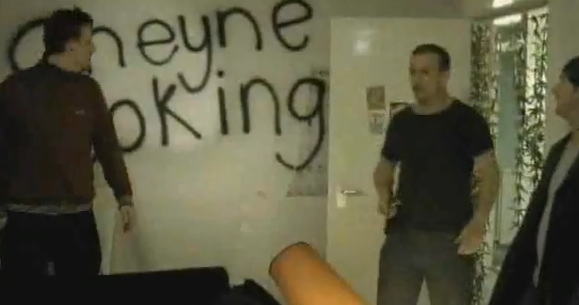
Death will be unlike the Mexican festivals, skeletons wearing top hats
The Mexican festival of "the Day of the Dead" takes place on 1st and 2nd November by tradition, and figures of skeletons (calaca) are used to decorate the festivals and parades which take place. A tall female skeleton called "La Catrina" is also present: Momus would revisit the day of the dead and La Catrina for a future song. Essentially, being a parade and festival and celebration of those who have passed, the Day of the Dead is nothing like actual death.
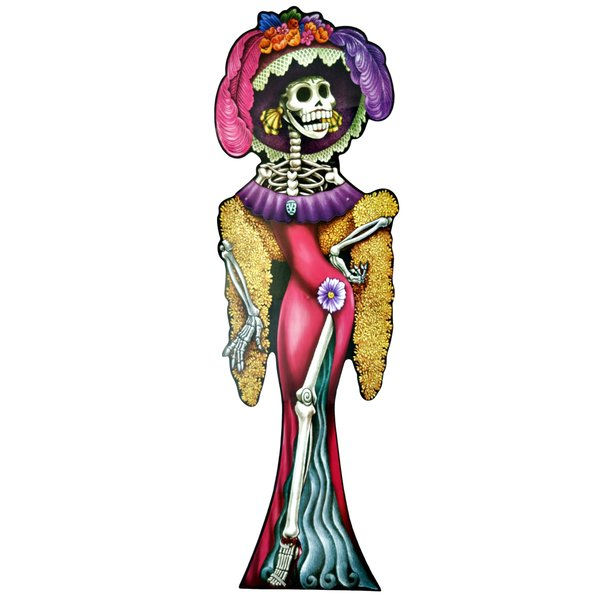
Death will be unlike the brownstone apartments that dynamite or dereliction collapse.
"Brownstone" is a term used chiefly in the US to refer to a building material made from sandstone. Brownstone is not a greatly durable building material, and houses clad in it are indeed at risk from dereliction. Since poorer areas of e.g. New York were notable for use of brownstone, and these areas were under renovation and what we would now call "gentrification" at the time, dynamite or dereliction were the chief threats to them. But the death of a building or neighbourhood is not the death we want explained.

Death will be unlike the mandolin the hangman relaxes by playing
The Hangman's Reel is a traditional tune played on the mandolin.
Some research into the history of the tune and the backstory can be found here:
The legend suggests it was the prisoner rather than the hangman who played, and it doesn't sound very relaxing at all.
Death will be unlike the Hound of the Baskervilles, chilling the moors with its baying
The third Sherlock Holmes novel, "The Hound of the Baskervilles", originally serialised in the Strand from 1901-1902, involves a monstrous Hound roaming the wilds of Dartmoor which seems to have supernatural appearance and strength. Easily the most famous of the Sherlock Holmes novels, it has been filmed and televised many times. The story was the first to be published after Holmes apparently died in "The Final Problem", so it certainly isn't death.
Death will be unlike the British museum, its bodies from peat bogs and bones
The British Museum does indeed include many bodies preserved in peat bogs, one of the most famous being the Lindow Man:
Preserved for posterity and eternity, he may be dead, but this is also not death.
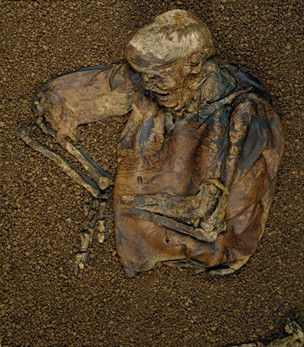
Death will be unlike the curse of the mummy that turns the explorers to stone
After Howard Carter discovered the tomb of Pharaoh Tutankhamun in 1922, a story spread that the archaeologist and his team were cursed. Indeed, various members of the team did come to a sticky end, and Carter himself died of Hodgkin's disease. No-one was turned to stone though. Medusa, one of the three Gorgons of Greek Mythology, who was killed by Perseus, did have that ability. I am not sure why the two stories have been conflated here.
Death will be unlike the great roller coaster, a plunge from a boast to a scream.
The tallest rollercoaster in the world, the Kingda-Ka, at Six Flags Great Adventure in New Jersey, has a drop of 418 feet. You wouldn't get me on there, and that's both a boast and a promise. Here's an amusing video in which Billy Corgan from the Smashing Pumpkins goes on a rollercoaster: https://www.youtube.com/watch?v=azhgpelu0vY
Death will be unlike mahogany coffins great pianists play in their wildest strangest dreams
I do not know if this relates to any particular pianist or dream that they had. It's a striking image and you can certainly buy piano themed coffins, but not sure if there is such a thing as a coffin themed piano. Would pianists necessarily dream about playing coffins? What am I missing here?

Death will be unlike a garden in autumn where poets can sit and compose
This is also a very generalised image: Autumn brings decay and the death of the summer, and the dying of the year. These are fruitful days for poetry of a romantic nature, but these musings are, of themselves, not death. Unless it was a garden where poets could sit and decompose.
Death will be unlike the granite memorials where memories wither in rows
Another type of garden, rightly acknowledging that the memorials in graveyards are only for the comfort of the living, also brings to mind the fields of crosses for fallen soldiers. Memories do wither, as in Huis Clos where the damned can only see visions of Earth as long as they are remembered, but these fade. Similarly the earthly memorials will decay as their inhabitants are forgotten.
Death will be unlike the charge of the Light Brigade Alfred Lord Tennyson rhymed
The Charge of the Light Brigade was a disastrous military action led by Lord Cardigan during the Crimean War. The Light Brigade were mistakenly sent to assault a Russian Artillery position, by a full frontal attack, which led to high casualties: afterwards 278 of "the 600" were killed, wounded, were missing or taken prisoner. The event was immortalised in a poem written shortly after by then Poet Laureate Alfred Lord Tennyson, with the famous lines:
"Someone had blundered. Theirs not to make reply, Theirs not to reason why, Theirs but to do and die. Into the valley of Death Rode the six hundred."
Death will be unlike the thin piece of paper that Reagan and Gorbachev signed.
This was the time of Threads: the terrifying 1984 BBC production written by Barry Hines which showed the aftermath of a nuclear attack on a British City. Nuclear war was still a very real and even likely outcome in the Cold War between Russia and the USA. The British Government had even issued leaflets to the populace giving advice on what to do in the event of nuclear war, a leaflet which was widely ridiculed even at the time. In 1982 the BBC science program QED also produced a film about the effects of a nuclear blast and radiation.
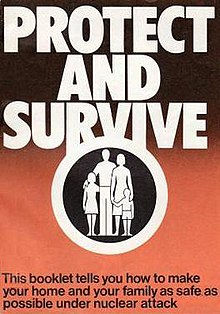
In 1986 Jimmy Murakami also directed an animated film "When The Wind Blows" which showed the effects of a nuclear war on an elderly couple, voiced by John Mills and Peggy Ashcroft, with an (underrated) theme song by David Bowie and songs by artists including Roger Waters and Hugh Cornwell on the soundtrack. John Mills being a veteran actor of many WW2 films was a good choice, as this emphasised how different a nuclear strike would be to the Blitz with which people were more familiar, and how hopeless survival would be.
The "piece of paper" line here refers to the Reykjavik Summit in 1986, where Presidents Reagan and Gorbachev signed an agreement to eliminate their nuclear arsenals within a ten year period. However because Reagan would not draw back on the Strategic Defence Initiative (also known as Star Wars), the agreement failed, although a further agreement to reduce their arsenals followed at the end of 1987.

Death will be unlike the hospital bedside with Novocain needles and cards
It is an important distinction that is made here: it is the bedside that is discussed, not the bed. It is the visitor at the side of the dying patient who sees the needles and brings the pointless cards. But they are not dying.
Death will be unlike the great day of judgement when God the headmaster presents the awards.
A jaundiced description of the Christian Apocalypse, when like a school master, God will give awards to the best and brightest pupils. According to some readings of the New Testament, only 144,000 "pupils" will receive the award of eternal life, this is believed by the Jehovah's Witnesses for instance. True fact: there are over 8.5 million Jehovah's Witnesses worldwide.
Death will be unlike the marriage that bickers 'til death do us part
Before seeing the lyrics I thought this line was "Death will be unlike the marriage: the Vicar said "Death do us part" ". Which would suggest a rather legalistic look at marriage vows and their relationship to oblivion. But in fact this was another statement akin to that in Murderers the Hope of Women, equating heteronormative marriage to being like death. (But not actually death). Which , being married, I will neither confirm nor deny.
Death will be unlike the dreams of the young man who sang "Love Will Tear Us Apart".
"Love will tear us apart" is a hugely admired and respected song originally released as a single in 1980 by Joy Division, with legendary producer Martin Hannett.
The lyrics were written by lead singer Ian Curtis who suffered from depression and epilepsy, and they deal with both his mental state and his marriage which was breaking down. Shortly after the release of this single, just before a tour of North America, Ian Curtis committed suicide.
Here is the video for "Love Will Tear us Apart", shot by the band: https://www.youtube.com/watch?v=zuuObGsB0No
Here is Ian Curtis on a rollercoaster:

Death will be unlike TV documentaries showing us life from outside
TV documentarians such as Michael Moore, Nick Broomfield and Louis Theroux are often accused of exploiting their subjects, and objectifying their issues and personalities in a way that demeans the ideas and beliefs of the participants. In 1986 the "Up" series of films documenting the lives of 14 participants at seven yearly intervals, had reached "28 Up" in 1984. Increasingly the everyday lives of British citizens were being mined for televisual treatment. This was the start of a process which culminated in the first broadcast of Big Brother in 2000, and the end of the world as we knew it. Incidentally Nick Broomfield wrote and directed a drama called "Ghosts" in 2006 which told a fictionalised version of the story of the Morecambe Bay tragedy of 2004 where 23 Chinese illegal immigrants working as cockle pickers were drowned when caught by the tide. Momus had previously told the story on the 2005 song "Cockle Pickers" on the album Otto Spooky.
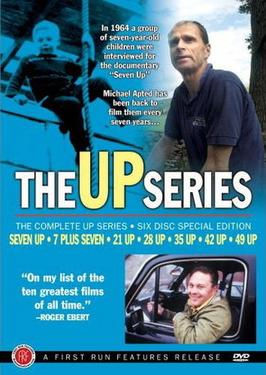
Death will be unlike the Buddhist nirvana the moth seems to seek in the light
Nirvana is a Buddhist term for a state of perfect peace and transcendence, in which the ego is eliminated and all ideas of the self and desire is gone. It is the final goal of Buddhism.
Moths naturally fly towards light as they use distant light points for navigation and become confused by seemingly brighter man made lights: as another term for Nirvana is enlightenment, it could be said that moths seem to seek this as well.
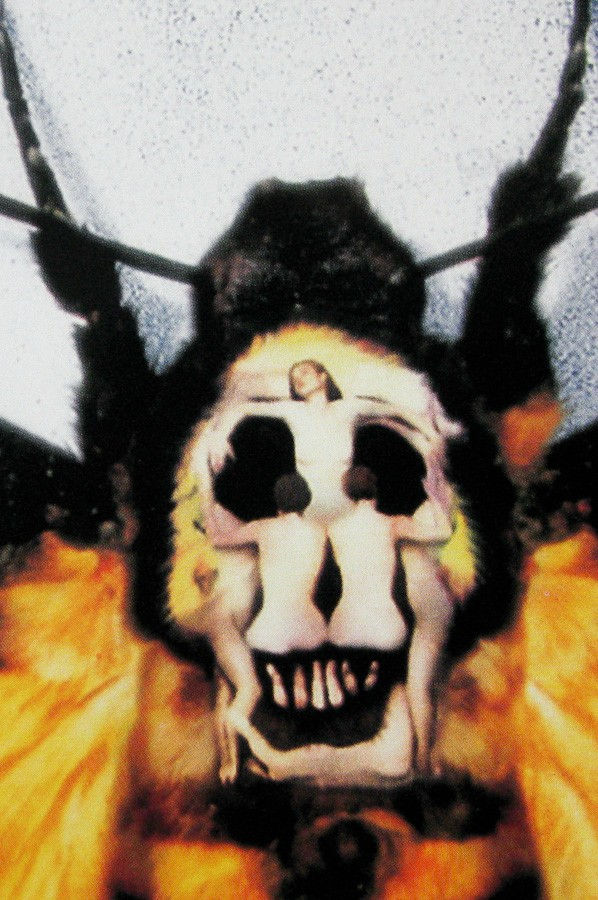
Death will be unlike the Cities of crystal they build in a few grains of smack
A poetic description of "smack" as a city of crystal: I am not clear whether Momus is just talking about heroin here, and is referring to rocks of the drug as crystal, or if he actually means crystal methamphetamine. The idolisation and worship of a drug as a god, as a "city", is a good metaphor for the destructive nature of addiction. Consider also the poem "Scarecrow on Fire" by Dean Young (1955), about a lost soul: "Everything is brushed away, off the sleeve, off the overcoat, huge ensembles of assertions just jars of buttons spilled, recurring nightmare of straw on fire, you the scarecrow, the scare, the crow, totems gone, rubies flawed, flamingo in hyena’s jaws, noble and lascivious mouth of the gods hovering then gone, gone the glances, gone moths, cities of crystal become cities of mud".
Death will be unlike the long picture window the coffin looks through to a widow in black
This conjures up a very precise image of grief, but contained grief, where the widow is separated from the corpse of her husband by a window and by the coffin itself, maybe standing stoicly, wiping a solitary tear. I do not know if this is a specific image from a book or film.
Death will be unlike a room full of spiders all clinging together and crying
I have no idea if this is a quote from a book or poem, what I will say is this: I am mildly arachnophobic and there is no way I am googling the phrase "a room full of spiders". Research it yourself. I do not think, however, that spiders have tear ducts.
Death will be unlike the wedding guest's story, the ship drifting lost and the dead sailors sighing.
In 1798 the English poet Samuel Taylor Coleridge published a long poem entitled "The Rime of the Ancient Mariner". The poem tells the story of a sailor who having killed an albatross is punished by a curse. His fellow sailors die but are reanimated to sail the ship to land. The sailor tells his story to a man on his way to a wedding, to teach him a lesson of guilt and forgiveness.
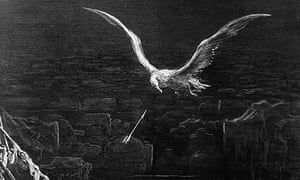
Death will be unlike the din in the steeple when cholera poisons the village
Traditionally, church bells are rung for celebrations and for disasters, and in this case to indicate to those outside the village that they should not approach. History relates, for instance, the story of Nigg Church, located on the entrance to the Cromarty Firth. When the village of Nigg was hit by an epidemic of cholera in 1832 a church elder leaving the vestry saw a cloud of water vapour hovering above the ground. Believing it to be a cloud of cholera he not only had the bells rung but threw a blanket and a stone over the offending cloud. The "Cholera Stone" is still there today.

Death will be unlike the illumination that Tolstoy provided for poor Ivan Illyich
Written in 1886 by Leo Tolstoy, "The Death of Ivan Illyich" is about a man who is dying and must evaluate what is important in life, with his final conclusion being that a moral life is the most important outcome: a successful but insincere life is worse than death.
Death will be unlike the wrinkling sea children glimpsed through the chinks in the boardwalk
It's not a wrinkling sea child, it's just the expanding bald patch on top of Bruce Willis' head as he sings "Under the Boardwalk" in 1986.
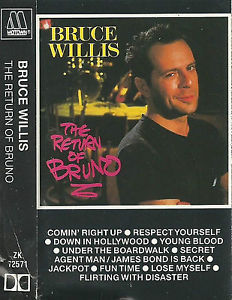
Death will be unlike the magical land of 'The Lion, The Witch and the Wardrobe'
In 1986 the BBC had not yet serialised C.S. Lewis' most famous work, but most British children would be familiar with the work either from the book or from the 1979 animated version made by CBS. In the book, four children find a portal to another world in the back of a wardrobe and meet a talking Lion called Aslan who helps them defeat an evil witch and free the kingdom of Narnia in a poorly disguised religious allegory.
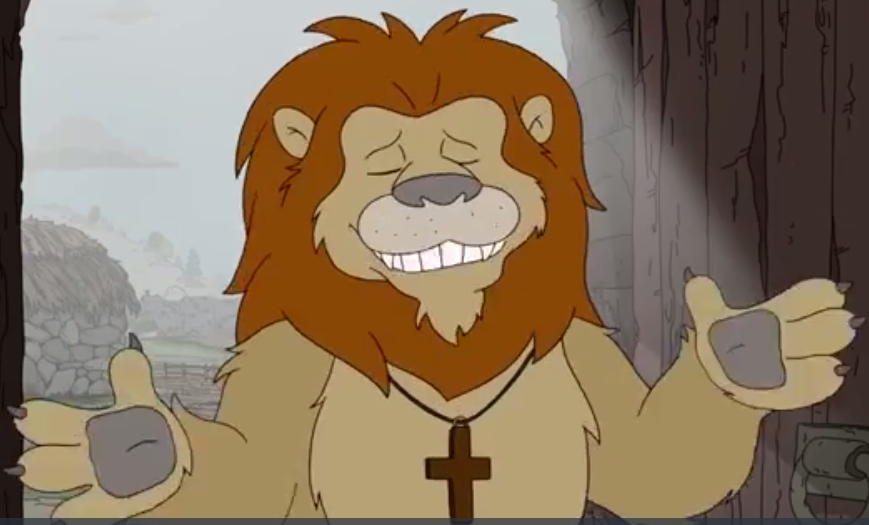
Death will be unlike the treacherous virus that murders the lovers with AIDS
At the time of this EP the government had yet to release the "Don't Die of Ignorance" campaign leaflets, but the public were certainly aware of the dangers of HIV and so this was a very topical reference. The language used here is interesting: how is the virus being "treacherous"? The line also seems to conflate AIDS and HIV and solely relate it to "lovers". Momus would return to the subject in the future, and with more care.
Death will be unlike the phantoms of freedom that lead the crowd over the barricades
In 1986 the fall of the Berlin Wall was three years away, but the signs were there. Spandau Ballet had just released their timeless classic "Through the Barricades" which dealt with the Troubles in Northern Ireland. But still the end of the Cold War and the Good Friday agreement would still have seemed like impossible dreams at the time, like phantoms of freedom. That or Momus had just seen Les Miserables.
National TV broadcasting services in the UK have a legal obligation to provide a certain amount of religious programming. In England that programme for a long time was called "The Epilogue", in which a Minister from the Church of England, Anglican or Roman Catholic church would give a short talk on a thought for the day. In Scotland the equivalent was called "Late Call", and the programme was parodied and ridiculed for the over-serious nature of some contributors. The Scottish comedian Rikki Fulton created a spoof version called "Last Call" for the series Scotch and Wry, featuring the Reverend I.M. Jolly, (the morose minister) who will make a further appearance in Momus' work on the album Oskar Tennis Champion in the track "The Laird of Inversnecky".
Death will be unlike 'The Pit and the Pendulum' co-starring Bela Lugosi
Bela Lugosi was a famous film actor in the Horror genre who gained world renown in 1931 when cast as Dracula by Universal Studios. Bela's appearance and Hungarian accent created the archetypal and definitive version of Dracula including his famous dialogue:
"Listen to them. Children of the night. What music they make. " and "I never drink ... wine".
Lugosi suffered from typecasting and was limited in taking roles by his heavy accent. When cast alongside others he tended to have the supporting role. In particular, he made many films with Boris Karloff (who had played Frankenstein's monster) and yet had very few films where he was billed as lead. Momus is therefore correct to say co-starring, but not correct to say "The Pit and the Pendulum". This is a short horror story written by Edgar Allen Poe which has been filmed many times, but not featuring Bela Lugosi. However in "The Raven" (1935) which features Lugosi and Karloff, and is based on Poe's writings, a Pit/Pendulum device does appear in the torture chamber owned by mad doctor Vollin, played by Lugosi.
Death will be unlike the bulge of the mouse inside the boa constrictor
The Boa Constrictor is one of over 50 species of Boa snake. It is native to South America and kills by constricting, which is to say it wraps around its prey crushing them and prevents the flow of blood in its victim, as well as asphyxiating them. They can live a long time, up to 40 years, and reach a length of up to 6 feet (1.8 m). A Boa Constrictor can certainly kill a mouse. As the jaws of the snake are attached by ligaments and not connected to bone, they can open very wide, up to 150 degrees. The body is then pulled down into the body by rhythmic contractions of muscles. If you really want to see it, here is a mouse being eaten.
Death will be unlike that drunkard the phoenix, so tight on the moonshine of golden elixirs
In Greek mythology the Phoenix was a bird, beautiful, vibrant, often described as having startling red and yellow feathers, which lived for 500 years and died in a blaze of fire. The next Phoenix would arise from the ashes of the old Phoenix, and so be essentially immortal.
The Phoenix traditionally ate Frankincense and other spices, and I haven't found a reference to it being drunk. "Tight" also means drunk, and "moonshine" is an illicit homemade alcohol often distilled from potatoes. (And Libby's difficult second carton drink after Um Bongo).
The "Golden Elixir" is a Taoist concept relating to having complete mastery of your own nature. Once you have the "Golden Elixir" you will have the power to ride a Phoenix.
I strongly suggest not doing so while drunk on moonshine. And for the love of God don't let the Phoenix drink. Alcohol is extremely flammable..and you will need the lift home.
Death will be unlike that violent pornography, dear to the Marquis de Sade
The Marquis de Sade was a French nobleman born in 1740 who became infamous for his sexual excesses around the infliction and enjoyment of pain. After accidentally poisoning several women at a party with Spanish Fly, he was imprisoned. Famously, he was held in the Bastille up to a few days before it was looted during the French Revolution. His written works include the novels 120 Days of Sodom (Saló) and Justine. He has bequeathed the English language the word Sadism and his works have been filmed numerous times, most significantly Saló was filmed by Pier Paolo Pasolini in 1975, and refused a certificate in the UK until 2000.
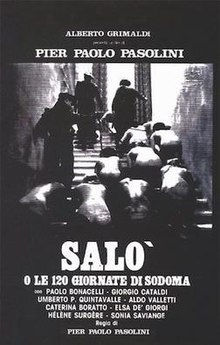
Death will be unlike the last stitch of clothing the stripper discards as her nipples grow hard
I can't really think of much to add to this. Death is not like a striptease, except that there is frustration at not being able to climax, a lack of closure, and a continual comparison of sex to death that runs through modern art and pop culture. Why are her nipples hard? Is she cold, or does Momus think she would find stripping for these gentlemen arousing?
Death will be unlike the bankrupt, handing over the keys to his house
It was the middle of the 80s when this song was released, the height of Yuppiedom and supposedly a boom time. But the dream was sour for many people, and for every rich city whizz kid there was a victim of Thatcherism in the gutter. Thatcher famously said "There is no such thing as society". More and more it seems that she was right, as we edge Food Bank by Food Bank closer to a divided, ghettoised Britain of Eloi and Morlocks. It is the 31st of August 2019 and I place this image below without comment:
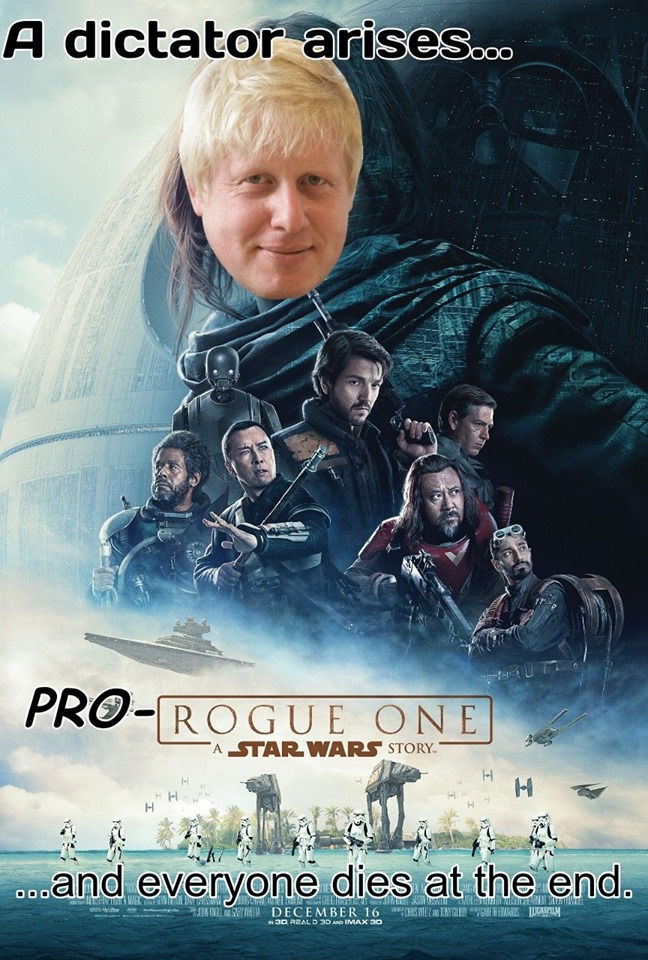
Death will be unlike the last day of summer, when insects grow stupid and swallows fly south
Insects hibernate in winter, and swallows do indeed fly south to South Africa from the UK.
From the RSPB (Royal Society for the Protection of Birds) site:
"The return journey to Africa takes about six weeks. Swallows from different parts of Europe fly to different destinations. Ours end up in the very south. They travel down through western France and eastern Spain into Morocco, before crossing the Sahara Desert and the Congo rainforest – finally reaching South Africa and Namibia."
Research shows that insects do move more slowly as the summer comes to an end and react more slowly. You can read some research into the changing music of insects of the summer here.
Hans Holbein's commissioned portrait of 1533 features two men of note: Ambassador Jean de Dinteville and the Bishop of Lavaur, Georges de Selve. The portrait contains several notable and hidden messages. For instance, the locations of the two ambassadors are noted on the globe in the background. Their ages are inscribed on their dagger and book. The floor is the floor of Westminster Abbey. Jesus Christ is peeking out of the curtain on the left, and amazingly a merchant by the name of David Bowie appears in the text of the book on the lower shelf. The objects behind the two men are scientific instruments, and it is possible that the three levels of the painting represent science, art and death. By far the most noteworthy aspect of the piece however is the skull, which as you can see does indeed slant through the painting. There is no evidence that the skull is that of a merchant, but many believe that the skull represents the mortality of the men portrayed. The skull is presented using an artistic device called anamorphosis: the skull is only visible when the painting is viewed from the top right or bottom left, like those street paintings that only make sense when viewed from a certain angle. The painting was possibly intended to be viewed from below or above on a staircase. This is a link to one of the most famous of the anamorphic street artists : Odeith

Death will be unlike that strange proposition on silence, the Tractatus of Wittgenstein
Admit it, you believed the David Bowie thing for a second.
The Austrian philosopher Ludwig Wittgenstein (1889 - 1951) published only one book in his lifetime: The Tractatus Logico-Philosophicus (1921).
The Tractatus is seen as a crystallization of his early work, in which he discusses the relationship between propositions (statements about the world which may or may not be true) and the world as experienced.
The work contains seven main propositions and subordinate statements which follow from each proposition. It is an ambitious work seeking to define the limits of what philosophy has to say about science and make explicit the difference between what can be said and what can be shown. For instance if we know that p causes q, then we can infer from q to the existence of p. If R also exists, we can only show it and not SAY/infer/deduce anything from it.
In seeking to codify the possible uses of inference and deduction, Wittgenstein used and popularised logical truth tables, in which the chain of deduction from premises to conclusions is ratified step by step and eliminates the need to have a "law of inference". (If p causes q and q causes r there is no need for a further "rule" inferring from r to p).
The Tractatus does also talk about silence, the final proposition says only "Whereof one cannot speak, thereof one must be silent". I should probably stop talking about Wittgenstein now because it hurts my brain.
Wittgenstein himself discussed various solutions to the paradoxical issues raised by the Tractatus, and in later years preferred to discusss the relationship between language and the world it describes as a language-game rather than a logical/philosophical system.
Death will be unlike your holiday snaps when the camera lets in the light
Less of a problem now we do not use film, but in 1986 digital cameras were still in prototype phase. The first fully digital camera commercially available was the Fujix DS-1P in 1988.
It is interesting that technology does not seem to be a concern or theme of Momus' songs at this time, instead the lyrics and themes tend to be more backward looking, but this would change markedly over the next few years.

Death will be unlike the honest-but-cold-blooded bank clerk whose hobby is homicide
Another bank clerk! Did Momus work as a bank clerk at some point? He certainly seems to have some interest in this occupation. They are more normally the victims of crime than the perpetrator, but you can certainly imagine a timid bank clerk being a killer in his spare time. But honest! Hard to picture someone working in banking being that..
Death will be unlike the hands of the clock, coming together at midnight
"Even a stopped clock is right twice a day", Marwood correctly opined in Withnail and I, the year after this was released.
Midnight onwards is sometimes known as the witching hour, the time the veil between our world and that of the undead is thinnest, and the time when both death and the forces of evil are strongest and most numerous. "Coming together at midnight" also brings
a hint of conjunction, of eclipses and alignments in the sky, also linked to supernatural occurrences.
Since 1947 an organisation composed of literal rocket scientists known as the "Bulletin of the Atomic Scientists has released a yearly report explaining how near to the end of humanity we are. To represent this danger, they use a clock, with the hands being at midnight representing the end of our species. In 1991, possibly owing to the end of the cold war, the clock hands were moved to 17 minutes to midnight, the furthest we have been from catastrophe. Now, in 2018/9, the clock is at 11:58. Only once before, in 1953 have we been so close to disaster with nuclear stockpiling and climate change being the two factors pushing us towards the witching hour. The Doomsday Clock, the Bulletin of the Atomic Scientists and "two minutes to midnight" all being cool sounding slogans, Iron Maiden are not alone in using musical cues from the committee.
Death will be unlike the grim amputations of medical students larking on rag night
Students in the UK have traditionally taken part in fundraising activities for charity, called "rag weeks", organised by Student Unions and involving any number of daft activities. The origin of the phrase may be from a time when students gathered rags to give to the needy, but to "rag" has meant to engage in disorderly activity since the mid 19th century. A description of student activities in Aberdeen University and the history of their "Rag Night" is here: http://www.mcjazz.f2s.com/PeasemealBattle.htm
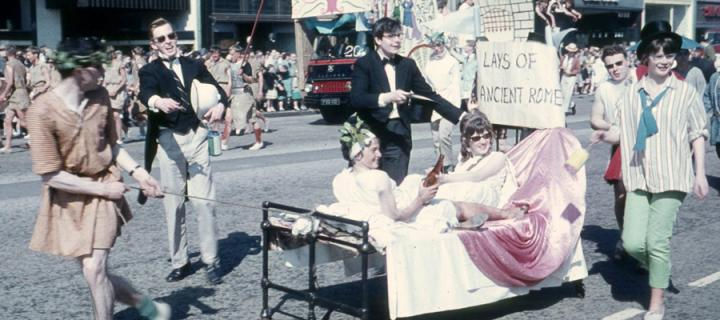
Medical students, with their journey into a highly ethical and responsible position, are particularly well known for their drunken antics on freshers' week, rag weeks and, well, at all times. They also have access to cadavers, real and fake skeletons and bodies donated for medical research or medical training, and have been known to do many things. Grim amputations on rag night? Quite possible. If you decide to leave your body to medical science, be aware that may mean giving it to students..
Death will be unlike the hijacker's voice in the heads of air traffic controllers
There had been a recent high profile hijacking of a Pan Am flight from Bombay to New York:
https://en.wikipedia.org/wiki/Pan_Am_Flight_73, a crime for which the FBI are still seeking suspects: https://www.fbi.gov/news/stories/new-images-released-in-1986-hijacking-case
Over 20 individuals were killed, including victims from the UK, so hijacking was as much a concern then as now.
Death will be unlike the sea as it thunders on Liv Ullmann vanishing under the rollers
Liv Ullmann is a Norwegian actress and director born in 1938 who for a long time was the muse of film director Ingmar Bergman. She appeared in Shame, Hour of the Wolf, Persona, and many others.

Bergman's films often use wild countryside and the forces of nature as metaphors for passionate emotion, change, loss and sexual frustration or expression. It is unsurprising that Momus should think of Liv Ullmann as vanishing under the storms of emotion depicted, although I am not sure there is any film in which this literally happens.
This could be remedied by using a different reference e.g. "Death will be unlike the sea as it thunders on R. Perrin vanishing under the rollers", which would work very well as he definitely did not die.
Death will be unlike the abbey the pilgrims all saw when they prayed
This may refer to the story of Walsingham: which I will quote from the Walsingham Village website.
"In 1061, in the reign of Edward the Confessor, the widow of the lord of the manor of Walsingham Parva, called Richeldis, had a vision of the Virgin Mary. Mary took Richeldis in spirit to Nazareth to show the place where the Angel Gabriel had appeared to her. Richeldis was told to take note of the measurements of the Holy House and build a copy of it in Walsingham. Richeldis saw the vision three times.
Carpenters were instructed to build the house but where? During the night there was a heavy fall of dew but in one meadow two spaces of equal size remained dry. Richeldis took this as a sign and chose the plot close behind a pair of twin wells.
The workmen tried to build there but found themselves unable to do so. They gave up in despair and consulted Richeldis. She spent all night in prayer. The next morning a miracle was discovered. The chapel was found fully completed and standing on the other dry spot. It was concluded that Our Lady had removed the Holy House to the place she herself had chosen. This is the Walsingham legend."
A miracle indeed: that of a builder working overtime and under budget!
There were in fact two "children's crusades" around the year 1212. The first led by a shepherd called Nicholas from the Rhineland, and the second by a French shepherd named Stephen of Cloyes. Both ended in failure and disillusionment, and few of the "children" who
accompanied them (in fact, a range of ages) actually reached the holy land, most dying on the way. Both crusades intended peaceful conversion of Muslims to the Christian faith. In fact, many children who paid merchants for passage to the Holy Land were instead sold into slavery, the "unholy land" at the end of the rainbow.
Death will be unlike the hell in Huis Clos Mr Sartre informs is just other people
Literally translated as "Closed Circle", and popularly translated as "No Exit", Huis Clos is a play written in 1944 by Jean Paul Sartre. It concerns three people: two women and a man, who having died are damned to hell and find it to be a drawing room from the 19th Century. Their torture is to be simply trapped with each other, and the hell of knowing they are viewed by each other, for eternity. All three can see visions of Earth and those who remember them, but only as long as they are in fact remembered. One woman finds the other woman attractive, and she in turn is attracted to the man. They talk, and argue, during the play, and realise they cannot harm or change each other or themselves. And so they must get on with it...
The play gave rise to the famous and to some extent misunderstood line "Hell is other people.." or "the others". Sartre wrote the play in Paris, and "the others" is a reference to the German occupation. Hell is not as such the presence of other people, but the knowledge that we exist only as the subject of other people's consciousness. Momus sounds slightly sneering in this line, "Mr. Sartre informs us.." would suggest that he does not agree with Sartre: certainly the play and concept are old enough now to be hackneyed. The concept of a psychological rather than physical hell and eternal torment has become something of a cliché in both serious and popular culture, most recently in science-fiction tv series such as Black Mirror. In the Christmas episode of Black Mirror hell is an infinitely long confinement in a kitchen in which a radio is playing THAT SONG by Wizzard on repeat (and cannot be stopped) while the body of a child whose death the protagonist accidentally caused is visible outside.

Metamorphosis is a short story written by Franz Kafka and published in 1915. Kafka was concerned with random events and their impact on individuals. in this case a travelling salesman - Gregor Samsa - wakes up one morning to find that he is transformed
into a life sized beetle. Rejected by society as vermin, he eventually starves himself to death. A girl - Grete - who cares for him also transforms - more conventionally - into a fully grown and beautiful young woman, who at the end of the story is just going out
into the world. Metamorphosis is by far Kafka's most well known short story, and has been dramatised in various ways since its publication. Many have attempted to analyse the story, often using religious metaphors or father-figure psychoanalysis.

Death will be unlike 2001, the room at the end of the ride
2001: A Space Odysssey was written by Arthur C.Clarke from a short story of his called "The Sentinel". It concerns an alien race which seeks to influence the evolution of mankind, by intervening and offering knowledge at various points in our development, for example giving the knowledge to use tools.
In 2001 a black monolith is found by human explorers on the moon, and examination shows it to be beaming a signal towards Jupiter.
A secret mission sent to Jupiter following the signal is sabotaged by the sentient A.I. (called HAL) which is on the spaceship. Having the real reason for the mission kept from it, the A.I. becomes paranoid and then insane, killing all but one of the crew, Dave Bowman.
After Bowman has disabled HAL he reaches the source of the signal, where he is sent through a stargate, or wormhole, to an alien world.

Here he lives out his life to old age in an alien reconstruction of an Earth style hotel room,
then is in some way reborn as a starchild, the next phase of human evolution. The reasons for the alien intervention are not addressed in the film version which was directed by Stanley Kubrick, or in the subsequent novelisation by Clarke. There are several published sequels by Clarke, and a sequel film called 2010. The rebellious A.I. on the spaceship Discovery, named HAL (which is probably a play on IBM) has become an iconic character in pop culture. The trip through the stargate is a classic of psychedelic cinema, and the entire film a considerable achievement in terms of special effects and cinematography given the year it was made, the film being largely experimental in style and making use of long sequences without dialogue.
The film uses music strongly: sequences using Strauss' Blue Danube and Also Sprach Zarathustra are well known enough to be parodied and pastiched.
The "room at the end of the ride" is the hotel room Bowman finds himself in, and although he grows old there, he is then reborn, and never dies.
Death will be unlike the wrath that Charles Bronson let loose on the Lower East Side
Death Wish is a 1974 exploitation movie directed by Michael Winner from a novel by Brian Garfield.
It follows the story of an architect called Paul Kersey, who is married with a daughter and in the film is played by Charles Bronson.
Paul's wife and daughter are followed home to their apartment by a group of muggers (including Jeff Goldblum in his first film role) who invade their home and sexually assault his daughter, beating his wife to death. Paul's daughter is left catatonic by the attack.
Later, when mugged at night, Paul beats his attacker with a roll of coins in a sock, and subsequently is given a gun as a present by a client.
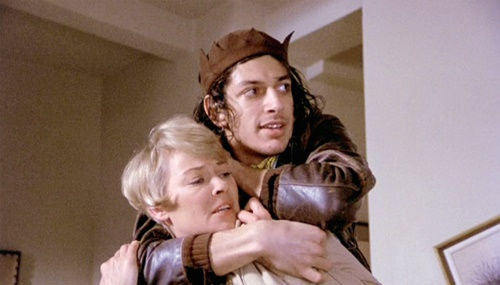
He is then mugged again (New York pre-Rudy innit?) and shoots his attacker, following this he goes out nightly to the Lower East Side to seek those who are attacking others and
kills several criminals. Just like Batman, but actually intending to kill them.
The police arrest him and are fully aware of his guilt, but in the end do not want to martyr him and send him to Chicago instead (arguably a worse fate than incarceration in Rikers).
There are several sequels to Death Wish, with the violence escalating in ridiculousness each time, ending in a mob boss being dissolved in a pool of acid by "The Face of Death" in 1994.
Worse, the original film was remade in 2018 with Bruce Willis, an unnecessary and already largely forgotten misstep.
Death will be unlike the House of the Shades the dog Cerberus guarded for Hades his master
Cerberus was a monster, a three headed dog in Greek Mythology who guarded the entrance to the Underworld, to prevent the dead leaving or rescuers entering. His master would have been Hades, the God of the Underworld. The world of the dead is being referred to as the House of the Shades: but this is also variously a Windows and Blinds company in Ontario, a dance class franchise and a website selling sunglasses. Meanwhile a three headed dog also appears in Harry Potter, named Fluffy, but it is unclear whether this is the same dog.
And death will be unlike that lesson on Infallibility, the Chernobyl disaster
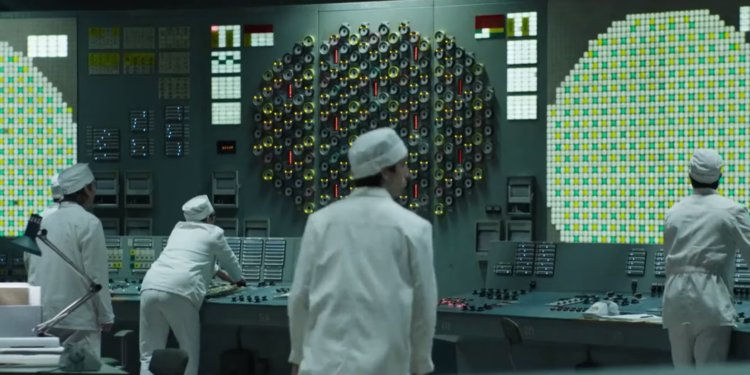
The No.4 nuclear reactor at the Chernobyl Power Plant, Pripyat, Ukraine, suffered an explosion and near meltdown on the 26th April 1986. When Momus sang about this, it was very current news and still causing death across its fallout area. As discussed above, nuclear war and the effect of radiation was a grave fear in this period. Much has been written about Chernobyl, and most recently in 2019 the disaster was the subject of a highly acclaimed HBO mini-series which outlined the causes and reasons for the disaster (although the content was disputed by Russian authorities).
And death will be unlike the empty career of the temp's vacillations gone permanent
During the early phase of his career Momus took many temping jobs to support himself. This line suggests a fear that if his career does not take off, he could be trapped in a cycle of temporary jobs forever, vacillations gone permanent. He spoke about this himself in an interview you can find here: https://www.tmcq.co.uk/interviews/momus/
“I think I’m now more finicky than I used to be, I don’t think I could live in London anymore. I wrote a line about the “temps vacillations gone permanent.” Back then I used to do temping work, like working in book stores. One major difference is that you could sign on and get your rent paid fairly easily then. I don’t think you can do that now.”
Much has already been said and written about how the more generous (or lax, depending on your viewpoint) attitude to jobseeking and signing on during the 70s and 80s in the UK allowed many aspiring artists, writers and musicians to develop their work while having rent paid for and only needing to work part time if at all. Momus may have been at the end of this period of time. Anyone trying to claim Universal Credit nowadays whilst spending all their time in a band, would soon be sanctioned into starvation.
Death will be unlike the unlucky omens the clairvoyant reads in the meaningless firmament In the meaningless firmament
A clairvoyant, from the French for "clear vision", pretends to / is able to (delete as appropriate to your IQ) see into the future by interpreting patterns in something. Aeromancy is the practice of divining the future by looking at the sky, clouds, and weather patterns, in much the same way that other clairvoyants use tea leaves (tasseography) or read the lines on palms (chiromancy). Others use crystals, or read the entrails of animals. Momus is clear in his view of such practices here: the sky (or firmament) is meaningless, and so are the predictions of doom (omens) that they see.
What Will Death Be Like?
Death will be like...
It seemed like this would never end, but suddenly it has, and the rest is silence.



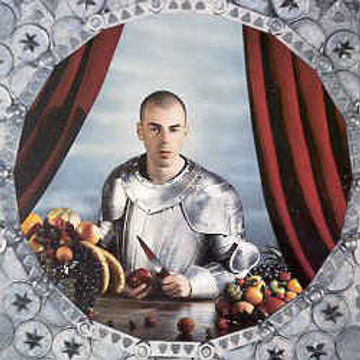
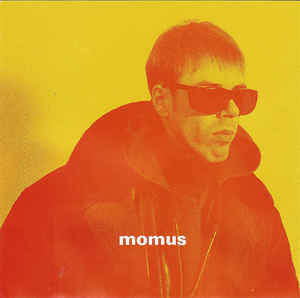

Comments